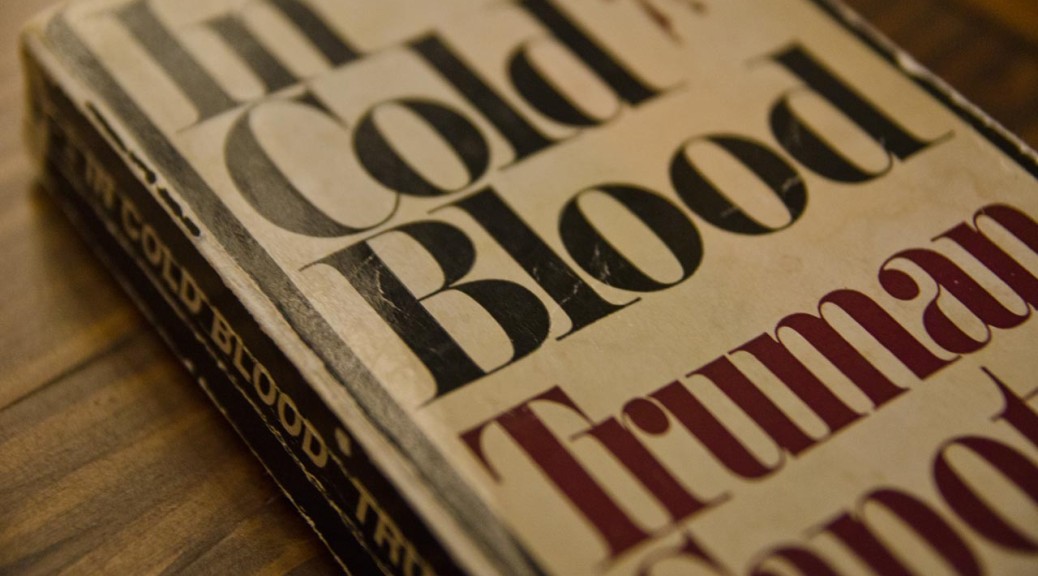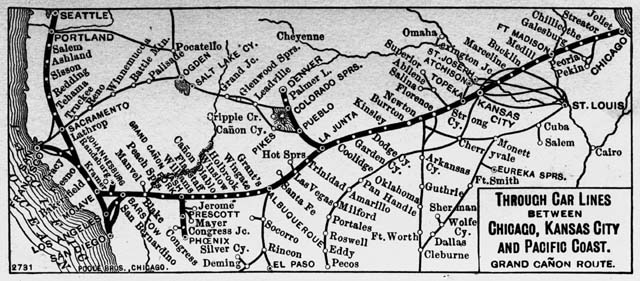Capote, Truman. In Cold Blood. New York, New York: Signet, 1965.
“She was seventy-four years old, but in Nye’s opinion, “looked younger–maybe ten minutes younger.”” p. 200
“Uh-huh. Came all the way from Kansas on a parole case. Well, I’m just a dizzy blonde. I believe you. but I wouldn’t tell that tale to any brunettes.” p. 202
“”Little punk tried to sweet-talk me out of paying rent the last week he was here.” She chuckled, presumably at the absurdity of such an ambition.” p. 202
“Then he wrote ‘For Sale’ on the windshield. One day I heard a sucker stop and offer him forty bucks–that’s forty more than it was worth.” p. 202-203
“Beyond one door, a drunken tenant wailed and sang in the firm grip of either gladness or grief. “Boil down, Dutch! Turn it off or out you go!” the woman yelled.” p. 203
Circle City, Alaska
“Here was a picture of the two together bathing naked in a diamond-watered Colorado creek, the brother, a pot-bellied, sun-blackened cupid, clutching his sister’s hand and giggling, as though the tumbling stream contained ghostly tickling fingers.” p. 210
“Neither one had ever before referred to the ultimate penalty in the State of Kansas–the gallows, or death in The Corner, as the inmates of Kansas State Penitentiary have named the shed that houses the equipment required to hand a man.” p. 215
“Valley View Cemetery, that gray-and-green island of tombs and trees and flowered paths, a restful, leafy, whispering oasis lying like a cool piece of cloud shade on the luminous wheat plains north of town.” p. 224
“Envy was constantly with him; the Enemy was anyone who was someone he wanted to be or who had anything he wanted to have.” p. 228
“Hot islands and buried gold, diving deep in fire-blue seas toward sunken treasure–such dreams were gone.” p. 230
“Once Nancy had said to him, “One summer, when we were in Colorado, I saw where the Arkansas begins. The exact place. You wouldn’t believe it though. That it was our river. It’s not the same color. But pure as drinking water. And fast. And full of rocks. Whirlpools. Daddy caught a trout.”” p. 233
“Perry soon developed his own personal gift for spying bottles. At first he merely indicated to the boy the whereabouts of his finds; he thought it too undignified to scurry about collecting them himself. It was all “pretty silly,” just “kids stuff.” Nevertheless, the game generated a treasure-hunt excitement, and presently he, too, succumbed to the fun, the fervor of this quest for refundable empties.” p. 238-239
“On an Arizona highway, a two-car caravan is flashing across sagebrush country–the mesa country of hawks and rattlesnakes and towering red rocks.” p. 262
“He continues to contemplate the scenery, to read Burma-Shave doggerel, and to count the carcasses of shotgunned coyotes festooning ranch fences.” p. 263
“He carried the knife and a flashlight. I had the gun.The house looked tremendous in the moonlight. Looked empty. I remember hoping there was nobody home–” p. 267
“The one window was curtained with Venetian blinds, but moonlight was coming through.” p. 267
“Among Garden City’s animals are two gray tomcats who are always together–thin, dirty strays with strange and clever habits. The chief ceremony of their day is performed at twilight. First they trot the length of Main Street, stopping to scrutinize the engine grilles of parked automobiles, particularly those stationed in front of the two hotels, the Windsor and Warren, for these cars, usually the property of travelers from afar, often yield what the bony, methodical creatures are hunting: slaughtered birds–crows, chickadees, and sparrows foolhardy enough to have flown into the path of oncoming motorists. Using their paws as though they are surgical instruments, the cats extract from the grilles every feathery particle.” p. 278
“Late at night, when the only noises were snores and coughs and the mournful whistle-wailings of Santa Fe trains rumbling through the darkened town, he honed the wire against the cell’s concrete floor. And while he worked he schemed.” p. 296
“a notion that he “might not be normal, maybe insane” had troubled him “even when I was little, and my sisters laughed because I liked moonlight. To hide in the shadows and watch the moon” p. 299
“the M’Naghten Rule, the ancient British importation which contends that if the accused knew the nature of his act, and knew it was wrong, then he is mentally competent and responsible for his actions.” p. 301
“The fine lawn surrounding the Clutter house was also newly green, and trespassers upon it, women anxious to have a closer look at the uninhabited home, crept across the grass and peered through the windows as though hopeful but fearful of discerning, in the gloom beyond the pleasant flower-print curtains, grim apparitions.” p. 304
“”In exodus Twenty, Verse Thirteen, we have one of the Ten Commandments: ‘Thou shalt not kill.’ This refers to unlawful killing. Of course it does, because in the next chapter, Verse Twelve, the penalty for disobedience of that Commandment reads: ‘He that smiteth a man, so that he die, share be surely put to death.’ Now, Mr. Fleming would have you believe that all this was changed by the coming of Christ. Not so. For Christ says, ‘Think not that I am come to destroy the law, or the prophets. I am not come to destroy, but to fulfill.’ And finally–” Green fumbled, and seemed to accidentally shut the Bible, whereupon the visiting legal dignitaries grinned and nudged each other, for this was a venerable courtroom ploy–the lawyer who while reading from the Scriptures pretends to lose his place, and then remarks, as Green now did, “Never mind. I think I can quote from memory. Genesis Nine, Verses Six: ‘Whoso sheddeth man’s blood, by man shall his blood be shed.'”
“soft slippers (in most American prisons such slippers are a condemned man’s customary footwear)” p. 347
“For this is the state’s execution chamber; when a man is brought here to be hanged, the prisoners say he has “gone to The Corner,” or, alternatively, “paid a visit to the warehouse.” p. 348
“Alvin “Old Creepy” Karpis, Charles “Pretty Boy” Floyd, Clyde Barrow and his homicidal sweetheart, Bonnie Parker” p. 348
“Andrews suffered no delusions, no false perceptions, no hallucinations, but the primary illness of separation of thinking from feeling. He understood the nature of his acts, and that they were prohibited, and that he was subject to punishment. “But,” to quote Dr. Joseph Satten, one of the examiners, “Lowell Lee Andrews felt no emotions whatsoever. He considered himself the only important, only significant person in the world. And in his own seclusive world it seemed to him just as right to kill his mother as to kill an animal or a fly.” p. 354
“The doors wide open. We could see the witnesses, a lot of guards, the doctor and the warden–every damn thing but the gallows. It was off at an angle, but we could see its shadow. A shadow on the wall like the shadow of a boxing ring.” p. 371
“Elegy Written in a Country Churchyard” by Thomas Gray
“The boats of heraldry, the pomp of pow’r
And all that beauty, all that wealth e’er gave,
Await alike the inevitable hour:
The paths of glory lead but to the grave.” p. 372
Andrews “He liked to imagine himself roaming around Chicago or Los Angeles with a machine gun inside a violin case. Cooling guys. Said he’d charge a thousand bucks per stiff.” p. 373
“I couldn’t rest in peace till the ones responsible had taken that ride on the Big Swing.” p. 376
“I believe in hanging. Just so long as I’m not the one being hanged.” p. 376
“A hearse, its blazing headlights beaded with rain, drove into the warehouse, and the body, placed on a litter and shrouded under a blanket, was carried to the hearse and out into the night.” p. 380
“”Gosh, I didn’t know he was such a shrimp.”
“Yeah, he’s little. But so is a tarantula.”” p. 381



